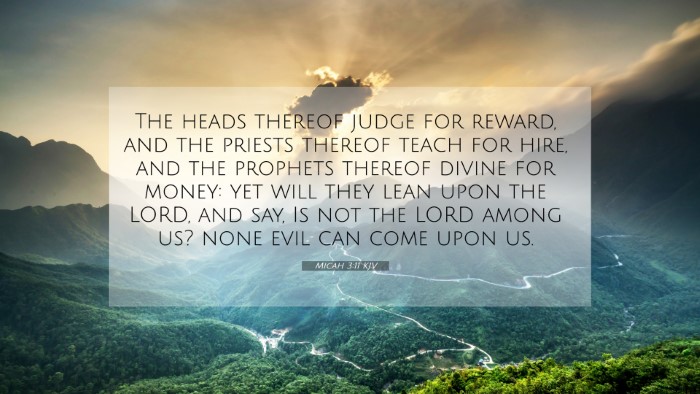Old Testament
Genesis Exodus Leviticus Numbers Deuteronomy Joshua Judges Ruth 1 Samuel 2 Samuel 1 Kings 2 Kings 1 Chronicles 2 Chronicles Ezra Nehemiah Esther Job Psalms Proverbs Ecclesiastes Song of Solomon Isaiah Jeremiah Lamentations Ezekiel Daniel Hosea Joel Amos Obadiah Jonah Micah Nahum Habakkuk Zephaniah Haggai Zechariah MalachiMicah 3:11 Similar Verses
Micah 3:11 Cross References
The heads thereof judge for reward, and the priests thereof teach for hire, and the prophets thereof divine for money: yet will they lean upon the LORD, and say, Is not the LORD among us? none evil can come upon us.
Uncover the Rich Themes and Topics of This Bible Verse
Listed below are the Bible themes associated with Micah 3:11. We invite you to explore each theme to gain deeper insights into the Scriptures.
Micah 3:11 Cross Reference Verses
This section features a detailed cross-reference designed to enrich your understanding of the Scriptures. Below, you will find carefully selected verses that echo the themes and teachings related to Micah 3:11 KJV. Click on any image to explore detailed analyses of related Bible verses and uncover deeper theological insights.

Jeremiah 6:13 (KJV) »
For from the least of them even unto the greatest of them every one is given to covetousness; and from the prophet even unto the priest every one dealeth falsely.

Isaiah 1:23 (KJV) »
Thy princes are rebellious, and companions of thieves: every one loveth gifts, and followeth after rewards: they judge not the fatherless, neither doth the cause of the widow come unto them.

Micah 3:5 (KJV) »
Thus saith the LORD concerning the prophets that make my people err, that bite with their teeth, and cry, Peace; and he that putteth not into their mouths, they even prepare war against him.

Jeremiah 7:4 (KJV) »
Trust ye not in lying words, saying, The temple of the LORD, The temple of the LORD, The temple of the LORD, are these.

Acts 8:18 (KJV) »
And when Simon saw that through laying on of the apostles' hands the Holy Ghost was given, he offered them money,

Titus 1:11 (KJV) »
Whose mouths must be stopped, who subvert whole houses, teaching things which they ought not, for filthy lucre's sake.

1 Peter 5:2 (KJV) »
Feed the flock of God which is among you, taking the oversight thereof, not by constraint, but willingly; not for filthy lucre, but of a ready mind;

Micah 7:3 (KJV) »
That they may do evil with both hands earnestly, the prince asketh, and the judge asketh for a reward; and the great man, he uttereth his mischievous desire: so they wrap it up.

Isaiah 48:2 (KJV) »
For they call themselves of the holy city, and stay themselves upon the God of Israel; The LORD of hosts is his name.

Jeremiah 8:10 (KJV) »
Therefore will I give their wives unto others, and their fields to them that shall inherit them: for every one from the least even unto the greatest is given to covetousness, from the prophet even unto the priest every one dealeth falsely.

1 Timothy 3:3 (KJV) »
Not given to wine, no striker, not greedy of filthy lucre; but patient, not a brawler, not covetous;
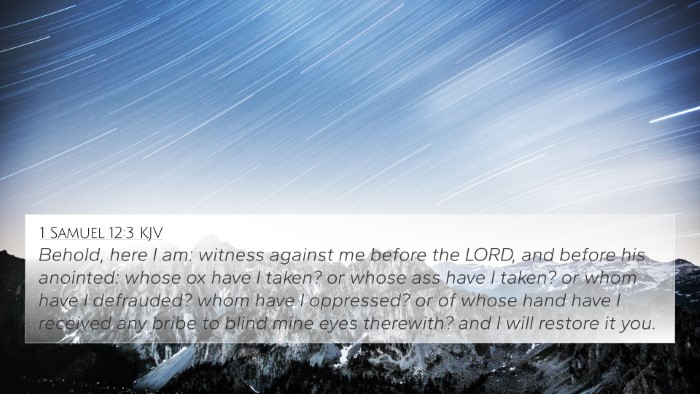
1 Samuel 12:3 (KJV) »
Behold, here I am: witness against me before the LORD, and before his anointed: whose ox have I taken? or whose ass have I taken? or whom have I defrauded? whom have I oppressed? or of whose hand have I received any bribe to blind mine eyes therewith? and I will restore it you.
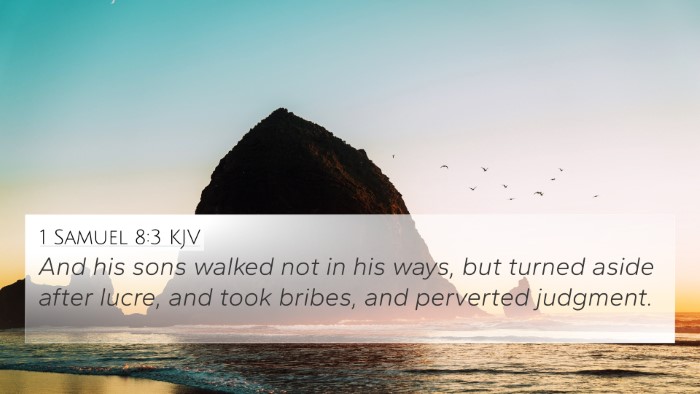
1 Samuel 8:3 (KJV) »
And his sons walked not in his ways, but turned aside after lucre, and took bribes, and perverted judgment.

Numbers 16:15 (KJV) »
And Moses was very wroth, and said unto the LORD, Respect not thou their offering: I have not taken one ass from them, neither have I hurt one of them.
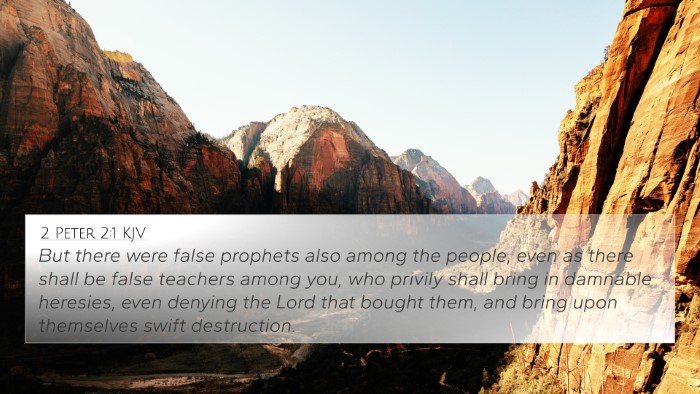
2 Peter 2:1 (KJV) »
But there were false prophets also among the people, even as there shall be false teachers among you, who privily shall bring in damnable heresies, even denying the Lord that bought them, and bring upon themselves swift destruction.

2 Peter 2:14 (KJV) »
Having eyes full of adultery, and that cannot cease from sin; beguiling unstable souls: an heart they have exercised with covetous practices; cursed children:

Romans 2:17 (KJV) »
Behold, thou art called a Jew, and restest in the law, and makest thy boast of God,

Jude 1:11 (KJV) »
Woe unto them! for they have gone in the way of Cain, and ran greedily after the error of Balaam for reward, and perished in the gainsaying of Core.

1 Samuel 4:3 (KJV) »
And when the people were come into the camp, the elders of Israel said, Wherefore hath the LORD smitten us to day before the Philistines? Let us fetch the ark of the covenant of the LORD out of Shiloh unto us, that, when it cometh among us, it may save us out of the hand of our enemies.
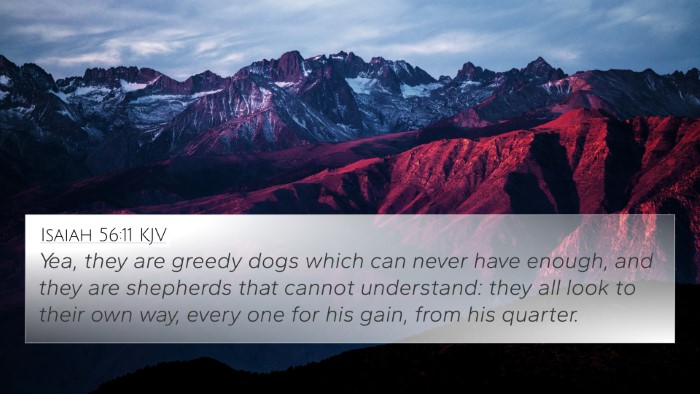
Isaiah 56:11 (KJV) »
Yea, they are greedy dogs which can never have enough, and they are shepherds that cannot understand: they all look to their own way, every one for his gain, from his quarter.

Amos 9:10 (KJV) »
All the sinners of my people shall die by the sword, which say, The evil shall not overtake nor prevent us.

Hosea 4:18 (KJV) »
Their drink is sour: they have committed whoredom continually: her rulers with shame do love, Give ye.

Ezekiel 22:27 (KJV) »
Her princes in the midst thereof are like wolves ravening the prey, to shed blood, and to destroy souls, to get dishonest gain.
Micah 3:11 Verse Analysis and Similar Verses
Understanding Micah 3:11
Micah 3:11 states: "Her heads judge for a reward, and her priests teach for hire, and her prophets divine for money: yet will they lean upon the LORD, and say, Is not the LORD among us? none evil can come upon us." This verse offers a profound insight into the moral and spiritual state of Israel, particularly its leaders and religious figures. Below, we will explore the meaning of this verse by synthesizing insights from public domain commentaries.
Contextual Overview
This verse comes against a backdrop of social injustice and corruption within the political and religious leadership of Israel. Micah, as a prophet, brought to light the failures of those in power and their exploitation of the people. The verse illustrates a disturbing irony, wherein the leaders profiting from their roles continued to falsely assure the people of God’s protection.
Commentary Insights
-
Matthew Henry's Commentary:
Matthew Henry emphasizes the corruption of leadership in Israel, noting that these leaders judged not for righteousness but for personal gain. He highlights how their actions show a complete disregard for their duties as shepherds of the people, acting instead like mercenaries. The phrase, "yet will they lean upon the LORD," encapsulates their misguided belief that their corruption would not incur God's displeasure.
-
Albert Barnes’ Notes:
Barnes elaborates on the hypocrisy of the leaders, indicating that while they exploit the people, they simultaneously profess confidence in God's presence. He warns of the delusion that the divine favor grants immunity from judgment, a theme recurrent in the Scriptures, where true obedience and righteousness are demanded of leadership.
-
Adam Clarke's Commentary:
Clarke reinforces the notion that these leaders are motivated by financial gain rather than genuine spiritual concern for the people. He also notes that the false security reflected in the exclamation about the Lord’s presence demonstrates a lack of true faith and repentance, which ultimately invites divine judgment.
Thematic Connections
This verse can be linked to several broader biblical themes, including:
- Corruption of Leadership: This theme resonates throughout the Bible, showcasing how poor leadership leads to societal downfall (cf. Isaiah 1:23, Ezekiel 34:2-3).
- The False Assurance of God's Favor: Many scriptures warn against the assumption of God's protection in the face of sin (cf. Jeremiah 7:4, Zephaniah 1:12).
- Integrity and Justice: The demand for integrity in leadership is a constant biblical theme (cf. Proverbs 29:14, Isaiah 10:1-2).
Cross References
Cross-referencing provides additional layers of meaning and context. Here are key verses related to Micah 3:11:
- Isaiah 1:23: "Your princes are rebellious, and companions of thieves: everyone loveth gifts, and followeth after rewards." This verse reflects a similar sentiment regarding corrupt leaders.
- Jeremiah 6:13: "For from the least of them even unto the greatest of them every one is given to covetousness; and from the prophet even unto the priest every one dealeth falsely." Highlighting the pervasive corruption among leaders.
- Ezekiel 34:2-3: "Son of man, prophesy against the shepherds of Israel, prophesy, and say unto them, Thus saith the Lord GOD unto the shepherds; Woe be to the shepherds of Israel that do feed themselves!" A direct critique of negligent leaders.
- Matthew 23:14: "Woe unto you, scribes and Pharisees, hypocrites! for ye devour widows' houses, and for a pretence make long prayer." This captures the essence of exploitation by religious leaders.
- Malachi 1:8: "And if ye offer the blind for sacrifice, is it not evil? and if ye offer the lame and sick, is it not evil?" This verse challenges the quality of offerings made by the people under corrupt leadership.
- Hosea 4:6: "My people are destroyed for lack of knowledge: because thou hast rejected knowledge, I will also reject thee." This emphasizes the responsibility of leaders to guide their people rightly.
- James 3:1: "My brethren, be not many masters, knowing that we shall receive the greater condemnation." A warning against the weight of accountability for teachers and leaders.
Conclusion
Micah 3:11 serves as a powerful reminder of the consequences of corruption among leaders and the perils of assuming God's favor without true righteousness. Through the insights from commentaries and cross-references, we understand that the Scriptures consistently call for integrity, justice, and genuine faith in leadership. The interconnectedness of biblical texts enriches our understanding of these themes.
For those utilizing tools for Bible cross-referencing, this verse can be an excellent starting point for exploring the connections between Bible verses, identifying how God’s message about righteousness, justice, and leadership resonates throughout both the Old and New Testaments.
Understanding Micah 3:11 within the broader framework of Scripture deepens our appreciation of God's call for integrity in all who lead—an imperative that reverberates through both time and culture.


